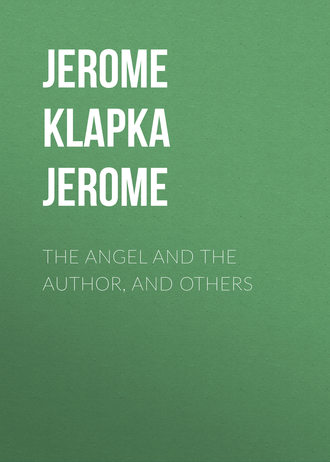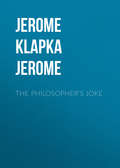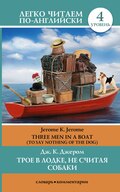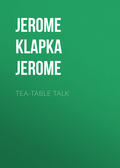
Джером К. Джером
The Angel and the Author, and Others
CHAPTER XVII
Parents and their Teachers
My heart has been much torn of late, reading of the wrongs of Children. It has lately been discovered that Children are being hampered and harassed in their career by certain brutal and ignorant persons called, for want of a better name, parents. The parent is a selfish wretch who, out of pure devilment, and without consulting the Child itself upon the subject, lures innocent Children into the world, apparently for the purpose merely of annoying them. The parent does not understand the Child when he has got it; he does not understand anything, not much. The only person who understands the Child is the young gentleman fresh from College and the elderly maiden lady, who, between them, produce most of the literature that explains to us the Child.
The parent does not even know how to dress the Child. The parent will persist in dressing the Child in a long and trailing garment that prevents the Child from kicking. The young gentleman fresh from College grows almost poetical in his contempt. It appears that the one thing essential for the health of a young child is that it should have perfect freedom to kick. Later on the parent dresses the Child in short clothes, and leaves bits of its leg bare. The elderly maiden Understander of Children, quoting medical opinion, denounces us as criminals for leaving any portion of that precious leg uncovered. It appears that the partially uncovered leg of childhood is responsible for most of the disease that flesh is heir to.
Then we put it into boots. We “crush its delicately fashioned feet into hideous leather instruments of torture.” That is the sort of phrase that is hurled at us! The picture conjured up is that of some fiend in human shape, calling itself a father, seizing some helpless cherub by the hair, and, while drowning its pathetic wails for mercy beneath roars of demon laughter, proceeding to bind about its tender bones some ancient curiosity dug from the dungeons of the Inquisition.
If the young gentleman fresh from College or the maiden lady Understander could be, if only for a month or two, a father! If only he or she could guess how gladly the father of limited income would reply,
“My dear, you are wrong in saying that the children must have boots. That is an exploded theory. The children must not have boots. I refuse to be a party to crushing their delicately fashioned feet into hideous leather instruments of torture. The young gentleman fresh from College and the elderly maiden Understander have decided that the children must not have boots. Do not let me hear again that out-of-date word – boots.”
If there were only one young gentleman fresh from College, one maiden lady Understander teaching us our duty, life would be simpler. But there are so many young gentlemen from College, so many maiden lady Understanders, on the job – if I may be permitted a vulgarism; and as yet they are not all agreed. It is distracting for the parent anxious to do right. We put the little dears into sandals, and then at once other young gentlemen from College, other maiden lady Understanders, point to us as would-be murderers. Long clothes are fatal, short clothes are deadly, boots are instruments of torture, to allow children to go about with bare feet shows that we regard them as Incumbrances, and, with low cunning, are seeking to be rid of them.
Their first attempt
I knew a pair of parents. I am convinced, in spite of all that can be said to the contrary, they were fond of their Child; it was their first. They were anxious to do the right thing. They read with avidity all books and articles written on the subject of Children. They read that a Child should always sleep lying on its back, and took it in turns to sit awake o’ nights to make sure that the Child was always right side up.
But another magazine told them that Children allowed to sleep lying on their backs grew up to be idiots. They were sad they had not read of this before, and started the Child on its right side. The Child, on the contrary, appeared to have a predilection for the left, the result being that neither the parents nor the baby itself for the next three weeks got any sleep worth speaking of.
Later on, by good fortune, they came across a treatise that said a Child should always be allowed to choose its own position while sleeping, and their friends persuaded them to stop at that – told them they would never strike a better article if they searched the whole British Museum Library. It troubled them to find that Child sometimes sleeping curled up with its toe in its mouth, and sometimes flat on its stomach with its head underneath the pillow. But its health and temper were decidedly improved.
The Parent can do no right
There is nothing the parent can do right. You would think that now and then he might, if only by mere accident, blunder into sense. But, no, there seems to be a law against it. He brings home woolly rabbits and indiarubber elephants, and expects the Child to be contented “forsooth” with suchlike aids to its education. As a matter of fact, the Child is content: it bangs its own head with the woolly rabbit and does itself no harm; it tries to swallow the indiarubber elephant; it does not succeed, but continues to hope. With that woolly rabbit and that indiarubber elephant it would be as happy as the day is long if only the young gentleman from Cambridge would leave it alone, and not put new ideas into its head. But the gentleman from Cambridge and the maiden lady Understander are convinced that the future of the race depends upon leaving the Child untrammelled to select its own amusements. A friend of mine, during his wife’s absence once on a visit to her mother, tried the experiment.
The Child selected a frying-pan. How it got the frying-pan remains to this day a mystery. The cook said “frying-pans don’t walk upstairs.” The nurse said she should be sorry to call anyone a liar, but that there was commonsense in everything. The scullery-maid said that if everybody did their own work other people would not be driven beyond the limits of human endurance; and the housekeeper said that she was sick and tired of life. My friend said it did not matter. The Child clung to the frying-pan with passion. The book my friend was reading said that was how the human mind was formed: the Child’s instinct prompted it to seize upon objects tending to develop its brain faculty. What the parent had got to do was to stand aside and watch events.
The Child proceeded to black everything about the nursery with the bottom of the frying-pan. It then set to work to lick the frying-pan clean. The nurse, a woman of narrow ideas, had a presentiment that later on it would be ill. My friend explained to her the error the world had hitherto committed: it had imagined that the parent knew a thing or two that the Child didn’t. In future the Children were to do their bringing up themselves. In the house of the future the parents would be allotted the attics where they would be out of the way. They might occasionally be allowed down to dinner, say, on Sundays.
The Child, having exhausted all the nourishment the frying-pan contained, sought to develop its brain faculty by thumping itself over the head with the flat of the thing. With the selfishness of the average parent – thinking chiefly of what the Coroner might say, and indifferent to the future of humanity, my friend insisted upon changing the game.
His foolish talk
The parent does not even know how to talk to his own Child. The Child is yearning to acquire a correct and dignified mode of expression. The parent says: “Did ums. Did naughty table hurt ickle tootsie pootsies? Baby say: ‘’Oo naughty table. Me no love ’oo.’”
The Child despairs of ever learning English. What should we think ourselves were we to join a French class, and were the Instructor to commence talking to us French of this description? What the Child, according to the gentleman from Cambridge, says to itself is,
“Oh for one hour’s intelligent conversation with a human being who can talk the language.”
Will not the young gentleman from Cambridge descend to detail? Will he not give us a specimen dialogue?
A celebrated lady writer, who has made herself the mouthpiece of feminine indignation against male stupidity, took up the cudgels a little while ago on behalf of Mrs. Caudle. She admitted Mrs. Caudle appeared to be a somewhat foolish lady. “But what had Caudle ever done to improve Mrs. Caudle’s mind?” Had he ever sought, with intelligent illuminating conversation, to direct her thoughts towards other topics than lent umbrellas and red-headed minxes?
It is my complaint against so many of our teachers. They scold us for what we do, but so rarely tell us what we ought to do. Tell me how to talk to my baby, and I am willing to try. It is not as if I took a personal pride in the phrase: “Did ums.” I did not even invent it. I found it, so to speak, when I got here, and my experience is that it soothes the Child. When he is howling, and I say “Did ums” with sympathetic intonation, he stops crying. Possibly enough it is astonishment at the ineptitude of the remark that silences him. Maybe it is that minor troubles are lost sight of face to face with the reflection that this is the sort of father with which fate has provided him. But may not even this be useful to him? He has got to meet with stupid people in the world. Let him begin by contemplating me. It will make things easier for him later on. I put forward the idea in the hope of comforting the young gentleman from Cambridge.
We injure the health of the Child by enforcing on it silence. We have a stupid formula that children should be seen and not heard. We deny it exercise to its lungs. We discourage its natural and laudable curiosity by telling it not to worry us – not to ask so many questions.
Won’t somebody lend the young gentleman from Cambridge a small and healthy child just for a week or so, and let the bargain be that he lives with it all the time? The young gentleman from Cambridge thinks, when we call up the stairs to say that if we hear another sound from the nursery during the next two hours we will come up and do things to that Child the mere thought of which should appal it, that is silencing the Child. It does not occur to him that two minutes later that Child is yelling again at the top of its voice, having forgotten all we ever said.
The Child of Fiction
I know the sort of Child the weeper over Children’s wrongs has in his mind. It has deep, soulful, yearning eyes. It moves about the house softly, shedding an atmosphere of patient resignation. It says: “Yes, dear papa.” “No, dear mamma.” It has but one ambition – to be good and useful. It has beautiful thoughts about the stars. You don’t know whether it is in the house or isn’t: you find it with its little face pressed close against the window-pane watching the golden sunset. Nobody understands it. It blesses the old people and dies. One of these days the young gentleman from Cambridge will, one hopes, have a Baby of his own – a real Child: and serve him darn-well right.
At present he is labouring under a wrong conception of the article. He says we over-educate it. We clog its wonderful brain with a mass of uninteresting facts and foolish formulas that we call knowledge. He does not know that all this time the Child is alive and kicking. He is under the delusion that the Child is taking all this lying down. We tell the Child it has got to be quiet, or else we will wring its neck. The gentleman from Cambridge pictures the Child as from that moment a silent spirit moving voiceless towards the grave.
We catch the Child in the morning, and clean it up, and put a little satchel on its back, and pack it off to school; and the maiden lady Understander pictures that Child wasting the all too brief period of youth crowding itself up with knowledge.
My dear Madam, you take it from me that your tears are being wasted. You wipe your eyes and cheer up. The dear Child is not going to be overworked: he is seeing to that.
As a matter of the fact, the Child of the present day is having, if anything, too good a time. I shall be considered a brute for saying this, but I am thinking of its future, and my opinion is that we are giving it swelled head. The argument just now in the air is that the parent exists merely for the Children. The parent doesn’t count. It is as if a gardener were to say,
“Bother the flowers, let them rot. The sooner they are out of the way the better. The seed is the only thing that interests me.”
You can’t produce respectable seed but from carefully cultivated flowers. The philosopher, clamouring for improved Children, will later grasp the fact that the parent is of importance. Then he will change his tactics, and address the Children, and we shall have our time. He will impress on them how necessary it is for their own sakes that they should be careful of us. We shall have books written about misunderstood fathers who were worried into early graves.
The misunderstood Father
Fresh Air Funds will be started for sending parents away to the seaside on visits to kind bachelors living in detached houses, miles away from Children. Books will be specially written for us picturing a world where school fees are never demanded and babies never howl o’ nights. Societies for the Prevention of Cruelty to Parents will arise. Little girls who get their hair entangled and mislay all their clothes just before they are starting for the party – little boys who kick holes in their best shoes will be spanked at the public expense.
CHAPTER XVIII
Marriage and the Joke of it
Marriages are made in heaven – “but solely,” it has been added by a cynical writer, “for export.” There is nothing more remarkable in human sociology than our attitude towards the institution of marriage. So it came home to me the other evening as I sat on a cane chair in the ill-lighted schoolroom of a small country town. The occasion was a Penny Reading. We had listened to the usual overture from Zampa, played by the lady professor and the eldest daughter of the brewer; to “Phil Blood’s Leap,” recited by the curate; to the violin solo by the pretty widow about whom gossip is whispered – one hopes it is not true. Then a pale-faced gentleman, with a drooping black moustache, walked on to the platform. It was the local tenor. He sang to us a song of love. Misunderstandings had arisen; bitter words, regretted as soon as uttered, had pierced the all too sensitive spirit. Parting had followed. The broken-hearted one had died believing his affection unrequited. But the angels had since told him; he knew she loved him now – the accent on the now.
I glanced around me. We were the usual crowd of mixed humanity – tinkers, tailors, soldiers, sailors, with our cousins, and our sisters, and our wives. So many of our eyes were wet with tears. Miss Butcher could hardly repress her sobs. Young Mr. Tinker, his face hidden behind his programme, pretended to be blowing his nose. Mrs. Apothecary’s large bosom heaved with heartfelt sighs. The retired Colonel sniffed audibly. Sadness rested on our souls. It might have been so different but for those foolish, hasty words! There need have been no funeral. Instead, the church might have been decked with bridal flowers. How sweet she would have looked beneath her orange wreath! How proudly, gladly, he might have responded “I will,” take her for his wedded wife, to have and to hold from this day forward, for better for worse, for richer for poorer, in sickness and in health, to love and to cherish, till death did them part. And thereto he might have plighted his troth.
In the silence which reigned after the applause had subsided the beautiful words of the Marriage Service seemed to be stealing through the room: that they might ever remain in perfect love and peace together. Thy wife shall be as the fruitful vine. Thy children like the olive branches round about thy table. Lo! thus shall a man be blessed. So shall men love their wives as their own bodies, and be not bitter against them, giving honour unto them as unto the weaker vessel. Let the wife see that she reverence her husband, wearing the ornament of a meek and quiet spirit.
Love and the Satyr
All the stories sung by the sweet singers of all time were echoing in our ears – stories of true love that would not run smoothly until the last chapter; of gallant lovers strong and brave against fate; of tender sweethearts, waiting, trusting, till love’s golden crown was won; so they married and lived happy ever after.
Then stepped briskly on the platform a stout, bald-headed man. We greeted him with enthusiasm – it was the local low comedian. The piano tinkled saucily. The self-confident man winked and opened wide his mouth. It was a funny song; how we roared with laughter! The last line of each verse was the same:
“And that’s what it’s like when you’re married.”
“Before it was ‘duckie,’ and ‘darling,’ and ‘dear.’ Now it’s ‘Take your cold feet away, Brute! can’t you hear?’
“Once they walked hand in hand: ‘Me loves ickle ’oo.’ Now he strides on ahead” (imitation with aid of umbrella much appreciated; the bald-headed man, in his enthusiasm and owing to the smallness of the platform, sweeping the lady accompanist off her stool), “bawling: ‘Come along, do.’”
The bald-headed man interspersed side-splitting patter. The husband comes home late; the wife is waiting for him at the top of the stairs with a broom. He kisses the servant-girl. She retaliates by discovering a cousin in the Guards.
The comic man retired to an enthusiastic demand for an encore. I looked around me at the laughing faces. Miss Butcher had been compelled to stuff her handkerchief into her mouth. Mr. Tinker was wiping his eyes; he was not ashamed this time, they were tears of merriment. Mrs. Apothecary’s motherly bosom was shaking like a jelly. The Colonel was grinning from ear to ear.
Later on, as I noticed in the programme, the schoolmistress, an unmarried lady, was down to sing “Darby and Joan.” She has a sympathetic voice. Her “Darby and Joan” is always popular. The comic man would also again appear in the second part, and would oblige with (by request) “His Mother-in-Law.”
So the quaint comedy continues: To-night we will enjoy Romeo and Juliet, for to-morrow we have seats booked for The Pink Domino.
What the Gipsy did not mention
“Won’t the pretty lady let the poor old gipsy tell her fortune?” Blushes, giggles, protestations. Gallant gentleman friend insists. A dark man is in love with pretty lady. Gipsy sees a marriage not so very far ahead. Pretty lady says “What nonsense!” but looks serious. Pretty lady’s pretty friends must, of course, be teasing. Gallant gentleman friend, by curious coincidence, happens to be dark. Gipsy grins and passes on.
Is that all the gipsy knows of pretty lady’s future? The rheumy, cunning eyes! They were bonny and black many years ago, when the parchment skin was smooth and fair. They have seen so many a passing show – do they see in pretty lady’s hand nothing further?
What would the wicked old eyes foresee did it pay them to speak: – Pretty lady crying tears into a pillow. Pretty lady growing ugly, spite and anger spoiling pretty features. Dark young man no longer loving. Dark young man hurling bitter words at pretty lady – hurling, maybe, things more heavy. Dark young man and pretty lady listening approvingly to comic singer, having both discovered: “That’s what it’s like when you’re married.”
My friend H. G. Wells wrote a book, “The Island of Dr. Moreau.” I read it in MS. one winter evening in a lonely country house upon the hills, wind screaming to wind in the dark without. The story has haunted me ever since. I hear the wind’s shrill laughter. The doctor had taken the beasts of the forest, apes, tigers, strange creatures from the deep, had fashioned them with hideous cruelty into the shapes of men, had given them souls, had taught to them the law. In all things else were they human, but their original instincts their creator’s skill had failed to eliminate. All their lives were one long torture. The Law said, “We are men and women; this we shall do, this we shall not do.” But the ape and tiger still cried aloud within them.
Civilization lays her laws upon us; they are the laws of gods – of the men that one day, perhaps, shall come. But the primeval creature of the cave still cries within us.
A few rules for Married Happiness
The wonder is that not being gods – being mere men and women – marriage works out as well as it does. We take two creatures with the instincts of the ape still stirring within them; two creatures fashioned on the law of selfishness; two self-centred creatures of opposite appetites, of desires opposed to one another, of differing moods and fancies; two creatures not yet taught the lesson of self-control, of self-renunciation, and bind them together for life in an union so close that one cannot snore o’nights without disturbing the other’s rest; that one cannot, without risk to happiness, have a single taste unshared by the other; that neither, without danger of upsetting the whole applecart, so to speak, can have an opinion with which the other does not heartedly agree.
Could two angels exist together on such terms without ever quarrelling? I doubt it. To make marriage the ideal we love to picture it in romance, the elimination of human nature is the first essential. Supreme unselfishness, perfect patience, changeless amiability, we should have to start with, and continue with, until the end.
The real Darby and Joan
I do not believe in the “Darby and Joan” of the song. They belong to song-land. To accept them I need a piano, a sympathetic contralto voice, a firelight effect, and that sentimental mood in myself, the foundation of which is a good dinner well digested. But there are Darbys and Joans of real flesh and blood to be met with – God bless them, and send more for our example – wholesome living men and women, brave, struggling, souls with common-sense. Ah, yes! they have quarrelled; had their dark house of bitterness, of hate, when he wished to heaven he had never met her, and told her so. How could he have guessed those sweet lips could utter such cruel words; those tender eyes, he loved to kiss, flash with scorn and anger?
And she, had she known what lay behind; those days when he knelt before her, swore that his only dream was to save her from all pain. Passion lies dead; it is a flame that burns out quickly. The most beautiful face in the world grows indifferent to us when we have sat opposite it every morning at breakfast, every evening at supper, for a brief year or two. Passion is the seed. Love grows from it, a tender sapling, beautiful to look upon, but wondrous frail, easily broken, easily trampled on during those first years of wedded life. Only by much nursing, by long caring-for, watered with tears, shall it grow into a sturdy tree, defiant of the winds, ’neath which Darby and Joan shall sit sheltered in old age.
They had commonsense, brave hearts. Darby had expected too much. Darby had not made allowance for human nature which he ought to have done, seeing how much he had of it himself. Joan knows he did not mean it. Joan has a nasty temper; she admits it. Joan will try, Darby will try. They kiss again with tears. It is a workaday world; Darby and Joan will take it as it is, will do their best. A little kindness, a little clasping of the hands before night comes.
Many ways of Love
Youth deems it heresy, but I sometimes wonder if our English speaking way is quite the best. I discussed the subject once with an old French lady. The English reader forms his idea of French life from the French novel; it leads to mistaken notions. There are French Darbys, French Joans, many thousands of them.
“Believe me,” said my old French friend, “your English way is wrong; our way is not perfect, but it is the better, I am sure. You leave it entirely to the young people. What do they know of life, of themselves, even. He falls in love with a pretty face. She – he danced so well! he was so agreeable that day of the picnic! If marriage were only for a month or so; could be ended without harm when the passion was burnt out. Ah, yes! then perhaps you would be right. I loved at eighteen, madly – nearly broke my heart. I meet him occasionally now. My dear” – her hair was silvery white, and I was only thirty-five; she always called me “my dear”; it is pleasant at thirty-five to be talked to as a child. “He was a perfect brute, handsome he had been, yes, but all that was changed. He was as stupid as an ox. I never see his poor frightened-looking wife without shuddering thinking of what I have escaped. They told me all that, but I looked only at his face, and did not believe them. They forced me into marriage with the kindest man that ever lived. I did not love him then, but I loved him for thirty years; was it not better?”
“But, my dear friend,” I answered; “that poor, frightened-looking wife of your first love! Her marriage also was, I take it, the result of parental choosing. The love marriage, I admit, as often as not turns out sadly. The children choose ill. Parents also choose ill. I fear there is no sure receipt for the happy marriage.”
“You are arguing from bad examples,” answered my silver-haired friend; “it is the system that I am defending. A young girl is no judge of character. She is easily deceived, is wishful to be deceived. As I have said, she does not even know herself. She imagines the mood of the moment will remain with her. Only those who have watched over her with loving insight from her infancy know her real temperament.
“The young man is blinded by his passion. Nature knows nothing of marriage, of companionship. She has only one aim. That accomplished, she is indifferent to the future of those she has joined together. I would have parents think only of their children’s happiness, giving to worldly considerations their true value, but nothing beyond, choosing for their children with loving care, with sense of their great responsibility.”
Which is it?
“I fear our young people would not be contented with our choosing,” I suggested.
“Are they so contented with their own, the honeymoon over?” she responded with a smile.
We agreed it was a difficult problem viewed from any point.
But I still think it would be better were we to heap less ridicule upon the institution. Matrimony cannot be “holy” and ridiculous at the same time. We have been familiar with it long enough to make up our minds in which light to regard it.







